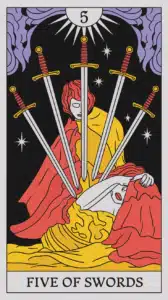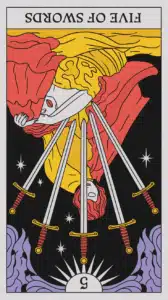Five of Swords Tarot Card Meaning: Conflict and Tension
Key Points
• Conflict and Tension: The Five of Swords can also represent conflicts, arguing or a deal going wrong for you. It points to life-force where each person (including you in thought) would be randomly enforced even relaxing yourself a new level or better by coming well enough above all!
• The crushing or losing that the break in one of a physical, institutional-and-emotional way. Thereby acquiring regret, or perhaps that success came at too high a price and the victory has proven pyrrhic.
• Reflection and Learning: Five of Swords also suggests that now it is time to reflect, with the element you get a learning lesson where there needs to be more thinking before actions. It makes that person question whether everything they worked harder for means anything at all.
Table of Contents
Five of Swords Introduction

The 5 of swords overview In a Tarot deck, the Five of Swords is typically seen as conflict, tension and being defeated. This is a battle where there are no real winners; not even the winner himself will feel fulfilled and content. This card is often read as conflict or disturbance of some kind – not outright deception, but there is a whiff of something in the air.
It is a sharp way of saying that not every battle should be fought and some victories can have costs that outweigh the potential gains. When it shows up in a reading, the Five of Swords means that you will need to rethink how you approach conflicts and consider the larger ramifications of your actions.
Symbolism and Imagery
Two swordsmen look back over the battlefield to a pair that walk away. Those three swords look pretty smug as two other figures walk away in defeat at the back. And that is exactly what the card offers to show — winning at any cost. Grey skies now seem temperamental and violent; they are disturbances.
Some of the key points on this card are:
- Swords: Malice, warfare in thought. Five swords from two other examples of the five cards that are surrounding her — obviously you have a very tight grip on things, but it’s kind of cold between them. His body language suggests triumph, but alone gives it a sense of hollowness.
- The Beaten Figures: Who are in retreat (Retreats, losses and emotional bankruptcy of conflict). They teach us that there is another way for when fights start to hurt not just the two original parties.
Symbolic Of A Stormy Sky: turbulent emotions, his unsettled nature. The Five of Swords is still one of my favorite cards to demonstrate that victory is seldom pure, illustrating that life can be pretty treacherous. It leads to introspection and encourages us to confront the ethical impact of our behaviors.
Five of Swords Tarot and Love
The Five of Swords upright – conflict, tension, discord. Upright, this card suggests that we take a moment to reflect on the actions and trials of life. It is a warning not to pick fights you can’t win, and not to cheat your way up the ladder.
Key ideas connected to the Five of Swords Upright:
- Stress and strain
Invert Reversed Position: That you want to make a change. Accept accountability for oneself; face up with responsibility. Sometimes a reversal suggests that the querent is feeling conciliatory and moving on, sometimes towards some kind of peace after an argument. It could mean that the trial and tribulation of time served may soon be over, leaving you with opportunity on your side!
Upright, the card will frequently indicate conflict or turmoil, an inner battle of cannot win from must not lose dynamic. Maybe this was the way in which to free themselves from that grudge and have less bitterness on their own shoulders.
FIVE OF SWORDS (reversed): It is the moment of healing and equilibrium where personally one does not want systemic losses to have happened. Five of Swords Reversed Key Themes: Reconciliation & Blameless Postmortem, Liberation Through Forgiveness and Surrender, Healing, Harmony. Humans who get temperamental with their internal disputes are being directed to develop skills for navigating themselves around Five Of Sword Energy Successfully.
Psychological/Emotional aspects: Conflicts and Solutions
Five of Swords according to Rachell Pollack’s Seventy-Eight Degrees of Wisdom (Part 1): Book. This card reads like that situation where no one really comes out the winner, maybe everyone goes away ashamed or feels they have been bested.
How Our Feelings Are Affected
The Five Swords represents a lot of emotional effects which are brought through all aspects of the card. There is near-universal agreement that this card reveals betrayal, and combined with the negative traits of our Fool character in the sense he has let his truest spirit be depleted or deceived.
The exodus of the emotional fines not only makes them more isolated and cynical, but it becomes a burden on their warring mind. At the same time, it does create room for emotional growth.
Facing this hard emotion will help you develop clarity about yourself and your relationship.
Five of Swords in Various Contexts

The reversed 5 of swords would suggest there may be some deceitful competitiveness or conflict within your working environment. This could represent something more ominous taking over the spread that is filled with power struggles instigated by corruption.
If you draw this card, it suggests that a toxic work environment may be in the making where your co-workers are more interested in playing the (I win-) game than in becoming involved with each other.
A toxic environment will also have an effect on productivity and job satisfaction. It could suggest that it is better for you to think about honourable tasks — remembering your integrity, rather than becoming a victim of mischief or manipulation.
Relationships & Love
In love, the Five of Swords often symbolizes a big fight that may involve outright conflict. This card can indicate discord and one partner not trusting the other. It could show that one person, or both, are engaging in something sinister — lying or manipulating — that causes a breakdown in communication and emotions.
In reversal in a love context, this card is an indication that there will soon be significant arguments or enmity that could directly cause the end of a relationship. But it is a reminder that repair can happen when both people truly express what they are thinking and feeling.
Personal Development
The Five of Swords encourages self-inquiry. It asks you where the purpose in that card is coming to life for the steps you are taking towards your desires and dreams. Does this step-by-step approach align with who you really are?
You might be at war with yourself, feeling bad about how things went. The Five of Swords teaches you that the lessons behind your experiences must never be wasted — they should act as stepping stones to further self-awareness, honesty, and integrity. This only makes you stronger and wiser.
Five of Swords in a Reading
It is generally pictured as the classic card where a person has three swords in their back and they are looking at two other people slinking away with their heads down.
Keywords: Pyrrhic victory; disharmony, hubris.
Common Spread Positions
The meaning of the Five of Swords remains fairly consistent whether upright or reversed in a spread but can change dramatically with reference to other cards that it appears either above, below, before, and after.
1. Before (past position)
Five of Swords in the past indicates that there may have been unresolved conflicts or more to be done.
2. Top position
This card warns of disputes or squabbling and you may win, but at what price? The character urges caution and contemplation before disagreements.
3. Five of Swords future position
This means trouble ahead. To ensure that we are spared later loss or regret, this card informs us: Get Ready!
4. Advice Position
Advice: sidestepping the harsher parts of things to come together in a calm place for an agreement. This card tells us to be aware that your actions now have long-term effects and you will not be able to avoid these consequences throughout life.
Instead of just winning something right now, for harmony down the line, it is better to seek a resolution.
5. Inverted Ten of Cups
Five of Swords and Ten of Cups represents family disharmony that may be stemming from an argument or other conflict. Both collectively symbolize an end to the current concern and peace is on its way back into your home for laughter and joy.
Frequently Asked Questions (FAQ)
How does the Knight of Swords interact with the Five of Swords in a reading?
When the Knight of Swords appears alongside the Five of Swords, it often signifies a rush into conflict without fully understanding the consequences. Both cards together suggest a scenario where hasty actions and aggressive communication can exacerbate existing tensions. It’s a call to pause and assess the situation objectively before proceeding.
What unique insights does the King of Swords bring when combined with the Five of Swords?
The King of Swords in conjunction with the Five of Swords brings intellectual clarity and authority to the table. He can provide a logical analysis of the conflict, urging you to find a resolution based on truth and fairness. This combination suggests that integrity and clear communication are essential to overcoming the dispute.
What does the Page of Swords add to the Five of Swords in a spread?
The Page of Swords paired with the Five of Swords indicates that the conflict may arise due to miscommunications or a lack of information. The Page’s curiosity and quest for knowledge emphasizes the need to dig deeper to understand different viewpoints before jumping to conclusions.
In what ways can perfectionist tendencies influence the meaning of the Five of Swords?
Perfectionist tendencies can exacerbate conflicts represented by the Five of Swords, leading to an unwillingness to concede or compromise. This card may highlight the stress and interpersonal tensions arising from unrealistic standards and expectations, pushing for more flexible and forgiving attitudes.
How is self-preservation depicted in the Five of Swords?
Self-preservation in the Five of Swords is often shown through self-serving actions that lead to winning at others’ expense. It underscores an inclination towards prioritizing personal gain over maintaining healthy relationships, potentially causing isolation or resentment from those affected.
What role does the concept of victory play in the Five of Swords?
Victory in the context of the Five of Swords is characterized by hollow triumphs. Although one might achieve their immediate goals, it often comes at a significant cost, such as damaged relationships or lingering feelings of guilt and regret. This card asks whether achieving your aims justifies the means.
How does communication impact the interpretation of the Five of Swords?
Communication plays a crucial role in interpreting the Five of Swords. Misunderstandings, harsh words, or manipulative speeches can fuel conflicts represented by this card. Improved communication skills are often necessary to resolve or mitigate ongoing disputes and prevent future ones.
What psychological impacts are suggested by the appearance of the Five of Swords along with the Knight of Swords?
The psychological impacts include impulsiveness, mental strain, and emotional volatility. The combination suggests that quick decisions made under stress can escalate tensions, leading to guilt or regret once the initial adrenaline rush passes. It encourages mindful reflection before acting.
How do men typically relate to the energy of the Five of Swords?
Men might relate to this card’s energy through themes of competition, dominance, and reasserting control. It can depict struggles where male figures are involved in asserting intellectual superiority or engaging in power plays, influencing how conflicts are navigated and resolved.
How can incorporating alternative beliefs alter the traditional view of the Five of Swords?
Incorporating alternative beliefs like mindfulness or holistic perspectives can transform the view of the Five of Swords from one centered on conflict to an opportunity for personal growth. These approaches encourage looking at underlying causes and learning from confrontations rather than simply viewing them as losses.

